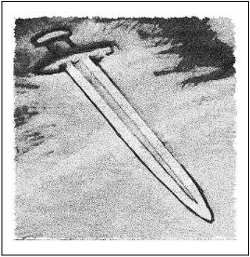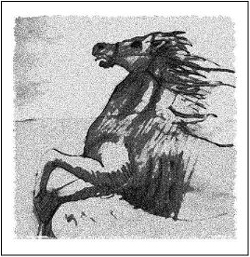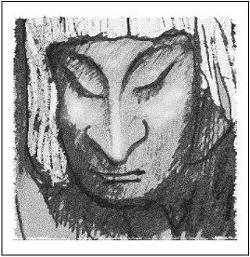The Dark Horse (6 page)

21

It smelt in Gudrun’s hut. Partly it was the smell of her wound, which was turning bad, but there was a mixture of other smells, too. Mouse had caught whiffs of them before, but never had she tasted them so strongly. Herbs. Herbs hanging from the ceiling to dry, with other less pleasant things. Bits of animals.
All for Spell-making, thought Mouse. Gudrun’s type of spells, anyway.
“Come here.”
Mouse heard a quiet voice in the darkness. There was Gudrun, lying on a low bed of heather by the far wall. She looked thinner than ever.
Mouse wasn’t exactly scared of Gudrun. She didn’t fear her because she was a Wisewoman, like some of the Storn did, and she didn’t fear her because she was frightening. But Horn treated Gudrun as an ally, and that was enough to put Mouse on her guard.
“Come here,” Gudrun said again. “I can’t speak any louder. Here. By the bed.”
Mouse knelt by Gudrun’s bed. “What do you want me to do?”
“Listen. I know you don’t trust me. . . .”
Mouse sat up straight. Perhaps she had underestimated Gudrun’s abilities. It was as if she’d just read her mind.
“No. I—”
“No, you don’t,” said Gudrun, trying to lift her head to look at Mouse. “Well. That’s all right. I’m not sure I trust you, either. So we’re even.”
Gudrun paused, out of breath. She winced and put her head back on her pillow.
“That’s right?” she pressed.
“Yes,” said Mouse. She could not see any harm in admitting it.
“You don’t trust me because I have Horn’s confidence,” Gudrun stated. She knew it was true, and Mouse didn’t bother denying it.
“Well,” Gudrun continued, “let me tell you. If you’re the Wisewoman to a tribe, it’s pretty important that the Lawspeaker trust you.”
Mouse nodded, but she wasn’t sure what Gudrun was getting at. She waited.
“I know you have powers,” said Gudrun. She watched Mouse to see if her words had any effect.
“I... I can do things,” said Mouse, struggling a little for words. “Some things other people can’t.”
“Yes,” said Gudrun. “Exactly.”
She paused again, to wait for the pain to pass. “That’s why you’re here. You’re the one person in this whole . . . this tribe that might be able to save me.”
Mouse said nothing.
“When was the last time anyone died during childbirth?” Gudrun went on. “When was the last time anyone died because of a wound going bad? You can’t remember because it hasn’t happened in a long, long time. I’m very good at what I do, with my herbs and powders. So listen. It’s a long time, but unless you do what I tell you, I’ll be the next. See?”
Mouse nodded. She stared at the mess that was Gudrun’s stomach.
22

So, like I say, Mouse grew up into the life of the village, though maybe there were some who never fully accepted her. Horn and Sif, obviously, but I think there were others, too.
Even when she made Gudrun well again, there were still some who feared Mouse. I suppose they had good reason to fear her, in a way.
That time with the fish, when Mouse told us where the fish were, and she was right.
There were other things, too, like her sleeping with the hounds, and I remember a time once when I surprised her accidentally. I was sleeping in our broch one afternoon when she came in. I woke slowly and got up. She hadn’t heard me, I suppose, because as I sat down next to her she leaped to her feet, snarling. Like, I can only say, like a wolf; lips drawn back, teeth showing. In an instant the look slipped from her face and she was a normal girl again.
That kind of thing happened on other occasions, and it was disturbing if you thought about it that way. But we could have used her, used her skills, to help us through the tough times.
Tough times! At least then it was only that food was hard to come by. The Dark Horse were no more than an old legend to us then. But it wouldn’t be long.
23

Mouse had done everything Gudrun had asked of her, and it had taken a long time.
Gudrun’s fire had gone out. That was the first thing. Mouse fetched a brand from the fire pit in the great broch to get it going again. Back in the hut she put her worries about Sigurd in the back of her mind and started the healing magic.
Under Gudrun’s instruction from the bed, Mouse took a branch of one of Gudrun’s herbs—sea rose, she called it. She chopped its tiny fingers of leaves and shoots until there was no piece larger than an ant. She did the same with a plant Gudrun called groundsel. Then she set the leaves to boil in a small pot in the fire. While that was stewing, she cleaned Gudrun’s wound. It had gone very bad very quickly.
“Dirty blade,” said Gudrun, trying to ignore the pain as Mouse pulled the sodden cloth from the wound.
“Dirty?” asked Mouse.
“That slob! Horn,” said Gudrun. “It’s dirty blades that make wounds fester this quick.”
Mouse stared at her.
“No, not evil magic. Dirt. That slob can’t even keep the Lawspeaker’s sword clean. Now look what he’s done to me!”
Mouse trotted down to the sea to fetch a bowl of water. With this she cleaned the wound. Not deep, but messy. That was the trouble.
“Lots of nasty corners for the dirt to hide in,” said Gudrun.
Then, again doing just what Gudrun told her, Mouse made a small amount of bread dough with the herb stew from the pot and a little oat flour. Gudrun was able to help press this dough straight onto her wound. A clean cloth to cover it.
“We’re done,” said Gudrun.
“Don’t we . . . you have to say some magic?” asked Mouse.
“No. That’s it. Same again tomorrow.”
Mouse started to leave.
“Mouse,” Gudrun said, stopping her.
“What is it?”
“Tell me something,” Gudrun said. Sif was not the only one who had thought about what had happened just before Gudrun’s accident.
“How did you open the box?” she asked.
Mouse said nothing.
“Horn tried to open it. He got
me
to try to open it.
No one
could open it until you just lifted the lid. How?”
But Mouse shook her head. “I must go. You must rest.”
“How?” asked Gudrun again.
“I don’t know,” Mouse said, and left.
24

Mouse. Olaf and Herda. Sif. All of them and many others ran from their brochs the moment they heard the cry. More soon joined them, including Freya.
“Stranger coming!”
It was true. A tall, thin, white-haired man had just walked openly into the center of the cluster of brochs. There was something slung over his shoulders. Then he stumbled and fell. He slumped to the ground, and his burden tumbled to the turf and rolled a foot or so.
“Sigurd!” cried Mouse.
She ran to him. Freya knelt down beside him, too.
Olaf took a step forward, then hesitated. He looked to the sky.
“Sigurd?” mouthed Freya.
Mouse felt his chest with her tiny hand. “He’s breathing!”
“Thank you,” said Olaf under his breath. He strode over to where his son lay and scooped him off the springy turf.
“Where’s Horn?” he barked at the people standing around.
No one answered.
“Well, until he shows up, lock that man in the grain barn.”
He nodded at the white-haired man, who hadn’t moved since he’d fallen, then he carried Sigurd inside. Only Mouse saw the tear roll down Olaf ’s rough cheek. She smiled.
There was a moment when no one did anything. Then Freya stood.
“You heard what Olaf said,” she murmured, and followed her husband. Mouse watched as a couple of men carried the stranger into the grain barn. Then she hurried after Freya.
25

Ragnald. The man with the white hair and the black palms. He was a mystery from the start, and he stayed that way.
His hair had gone white from the frost, he said, and the frost had blackened his palms. He’d been traveling for years, through the cold lands of the north, slowly coming south. And he knew about the box. He said that it was his and that it contained magic of all sorts. (Except we knew it was empty.)
I don’t know which of this was true, nor does it matter much now.
26

Sigurd was unconscious. The man with white hair was not.
“Hey!” he called from the grain barn. “Let me out!”
Someone was sent to find Horn.
“I won’t hurt you! Won’t you even talk to me?”
After a while Horn came out to see what was going on. He staggered a little, as if he’d been drinking.
“Well, where is he?”
“In the barn, Horn,” one of his men said.
“Well, get him out. Let’s see him. Have your weapons ready, mind.”
Mouse, who had come to the door of the broch to watch, didn’t know whether to laugh or cry as she saw Horn’s finest warriors gird their loins, and their swords, in the face of a single stranger.
The man stepped out cautiously. He looked around him, and he looked different. The villagers, almost all light brown or blond haired, had never seen pure white hair before. And he was nearly a foot taller than their tallest man.
He looked from one face to another, then approached Horn, apparently having worked out that he was the leader.
“Mighty Chief, I mean no harm, I simply—”
“No farther, stranger!”
Horn drew his own sword but remembered too late that he had broken Cold Lightning on the box. He waved the stump at the man, pretending it was what he had meant to do. Mouse saw Herda shaking his head grimly. At least there was the strong Thorbjorn, with his smith’s hammer, standing nearby.
“My noble lord,” the man tried again, “I am a simple traveler; I mean no harm.”
“What is your name, stranger? Where are you from?”
“From the south. A city far to the south. Skerry. No doubt a lord as great as yourself will have heard of it?”
Horn swayed on his feet a little.
“Of course,” he said after a moment.
“Great Lord, my name is Ragnald. I am a simple traveler and was caught in a shipwreck not far down the shore from here.”
He paused. Mouse watched as Horn and Ragnald sized each other up. Surely the stranger could tell Horn was drunk?
“My noble lord, I mean no harm. I found the boy—”
“The boy!” Horn said suddenly, finding something he could threaten the man with. “What did you do to the boy? You would harm one of my people?”
He took an unsteady, though menacing, step toward Ragnald. He was still waving his sword stump.
“No,” said Ragnald, “I found him. Indeed, I saved him. Why would I bring him back here if I meant him ill? Your Lordship is wise to mistrust a stranger,” he added quickly.
Horn thought about this.
“What,” he said eventually, “are you doing here?”
For the first time the newcomer was short of words.
“I . . . am a . . . an entertainer,” he said after a pause. “Yes! I have entertained many people in many lands, across all the seas and islands. The poor and the weak, the rich and the strong. Great rulers, like yourself. I have traveled far, and often I have exchanged a story or two for a bed. And now I find myself here. . . .”
He smiled at Horn, but showing utmost respect.
“I see,” said Horn uncertainly.
“I don’t see,” said a voice from behind Mouse. Olaf pushed past her and strode out into the center of things. Murmurs spread through the crowd.
Olaf walked right up to Ragnald, until his face was just a foot away from the white-haired man’s.
“My boy is lying hurt in there,” said Olaf. “He will not wake. Just what happened? Tell me that!”
But Horn regained his grip.
“Olaf ! Get away! I am in charge here! Or would you like to take our friend’s place in the grain?”
Some of Horn’s men closed around Olaf a little. He laughed at them, but he did as he was told.
Horn turned back to the stranger. “You. Rag . . . ?”
“Ragnald, my lord.”
“Ragnald. What kind of entertainer are you?”
“I am sorry to say that at present I am a very poor entertainer, for everything I need is contained in a box. A very special wooden box. I lost it when I was cast ashore. Have you, by any chance, seen such a thing?”
The man gestured with his hands as he spoke. Now the shape they held, invisibly, was the box. Then he shrugged, his black palms up. As the people saw them they drew breath, wondering what disease or experience had caused this bizarre disfigurement.
There was a long silence. People stared at Horn. Horn stared at his people.
“No,” he said. “No, we have found nothing like that.”
The man studied Horn’s face for a moment longer than perhaps he should have, but after a moment more he spoke.
“Then I am a very poor entertainer indeed, for the box contains magics of all kinds, and without it I am nothing.”
